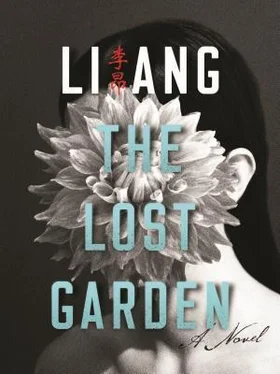When she was ready to leave, Lin offered to take her home. The decadent entertainment had yet to reach its apex, even at two in the morning. On that misty spring night, on a street devoid of traffic, she spotted his snow-white, long-body Rolls Royce, a behemoth of a car that, under the silent night sky, seemed to take up the whole block.
As if the spell had been broken, the fancy car did not come equipped with an elaborate ritual — Lin opened the rear door for her and followed her in. When he shut the door, she noticed the luxuriously appointed interior as well as the driver, who looked to be in his forties, with a crew cut like a worker from the countryside. Wearing a flashy patterned shirt made of synthetic fabric, he placed his large, brown laborer’s hands on the leather-wrapped steering wheel.
She laughed despite herself as the car began to glide forward, the windows shutting out all outside noise. A soundless world existed beyond the window on late-night deserted streets, removing all sense of the real; what flashed past her eyes was more like a moving stage set. The car rolled on smoothly, at a steady speed; she felt no bumps in the road. Everything before and around her was a silent declaration of an imposing air that left no room for questions, the thought of which made her somewhat light-headed, as if caught up in a strange dream.
Her place was in a one-way alley off Zhongshan North Road in the Yuanshan District. It looked to be too narrow for the Rolls, but that, in fact, provided a moment for the driver to show off his skill. She told him to stop in front of the red gate of a two-story building. Lin showed no sign of opening the door for her, nor did the driver, who was sitting comfortably in the front seat. She reached out for the handle, opened the door, and pushed out; it was unexpectedly heavy, like the car itself, as if its express purpose were to impress.
“Such a heavy door,” she said.
Lin followed her out.
“It’s late and I don’t want to wake up Mudan. I have to walk all the way across the yard.” She knew she was being incoherent. “It’s late, I … I’m kind of scared. Could you wait by the gate until I open the door?”
Wordlessly he moved to the side.
She opened the gate, revealing a large yard with a red-brick path flanked by lush vegetation several feet tall. The overgrown greenery had gone wild, trees layering on top of and into each other, an untamed mass that was overtaking the path.
The lush foliage had migrated into a grove of dark and light greens, overcrowding as it reached upward, displaying its indomitable vitality, a force to be reckoned with. It took him a while to realize that a patch of dark-green vegetation was, in fact, overgrown weeds. But, with its powerful urge to grow, it spread all over the place, filling every possible space, wild and disorderly. But when he realized that it was only untamed weeds, the patch of green emitted a sense of extreme degradation, a sort of ruin from prolonged neglect.
By then she had passed through tall, dark-green weeds that brushed against the hem of her long skirt, and reached the far side of the yard, where she stopped beside a small red door.

Like many lovers, they often repeated the story of how they had fallen in love. Naturally, she wanted to hear him talk about it; he was quiet at first, and she detected the same shyness on his face as before. He even looked away to avoid her gaze.
“It was that night when I took you home and you said you were afraid to walk across the yard,” he said evasively, obviously uncomfortable with revealing his emotion, like most Taiwanese men at the time.
She brought it up again when they knew each other better, for she needed more verbal assurance. Now that they were so much closer, he was increasingly at ease and direct:
“Didn’t I say you looked like someone born in the last century? Few girls these days have your demeanor, an air of competence instilled by growing up in an established family. I always thought you were so strong, capable of anything,” he said in a soft, tender voice, “so I was surprised to know you weren’t as brave as I thought, even frightened sometimes.”

A few days later he called her at work, asking about her schedule. He was in such a hurry he hung up after she managed to say that she went to bed late.
At eleven that night he called from Los Angeles, where it was seven in the morning; the shades in his hotel room were drawn and his wristwatch still showed Taipei time.
He’d gone to L.A. on real estate business. Over the past thirty years, a large number of Taiwanese had emigrated with the fruits of Taiwan’s economic growth; it was no longer just a dream to create a high-end residential area for Taiwanese immigrants in L.A. This was exactly what he’d always wanted — a global empire.
This was the first time they’d talked by phone. It was late, so every word he said in the quiet of the night seemed to go straight to her heart. She just listened. Though thousands of miles apart, his voice sounded as though they were in the same city; it was truly as the saying goes, far apart and yet so close.
She had picked up the phone in the living room, which had kept her from putting on something warmer. Now the cold spring-night air began to seep through her white silk pajamas, forcing her to cover herself with several cushions. The black satin cushions with their gold threads had been cold, but after coming in contact with her body, the cotton filling began to serve its function of warming her.
Gently she brought up the cost of international calls, especially because they had been talking for some time.
He went quiet for a while on the other end.
“You know what? I found your sense of decorum particularly endearing.” He quickly added, “I never have time to make phone calls except when traveling. Back in Taiwan, I’m always busy with so many things it’s impossible to have a good phone conversation. All my friends know I’ll only call them when I’m on the road.”
She laughed softly and said:
“An expensive hobby.”
“I work so hard, traveling back and forth between Taiwan and the U.S. And for what, if not to be able to spend money whenever and however I like?”
Then his tone turned serious.
“I’m proud of being a Taiwanese now. Finally, we can afford to chat on international calls and fly first class on business trips or personal travel. Pretty soon, we’ll own private jets, like the super rich in developed countries.” He was getting animated. “I take great pride in the fact that, within a brief decade or two, we have amassed so much wealth that we can spend money however we want.”
He quickly changed the subject, as he often did.
“Before I left, I sat in on a management forum at the Shangri-la Hotel. The speaker was a young M.B.A. who seemed to be following the trend of critiquing everything. He said that the flour sacks from the American Aid all had serial numbers. When we fashioned clothes out of those sacks, we each wore a number, like piglets raised on American flour. We were branded, just like the cattle in American Westerns.”
“That was a time of pervasive poverty,” she said gently.
“It sure was! Back then almost everyone was poor.” He agreed casually, obviously unperturbed. “The M.B.A. also said that it began with the American Aid, followed by all sorts of special treatment by the American government, which steered Taiwan onto the road of a capitalist model we can never shake off. The multinational companies and our reliance on foreign capital give the Americans absolute control of Taiwan.”
Читать дальше













